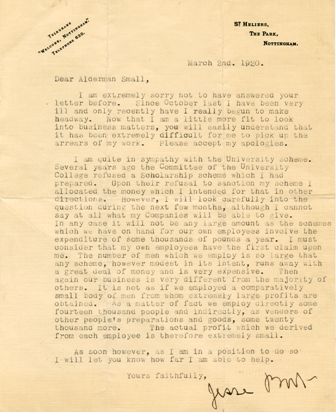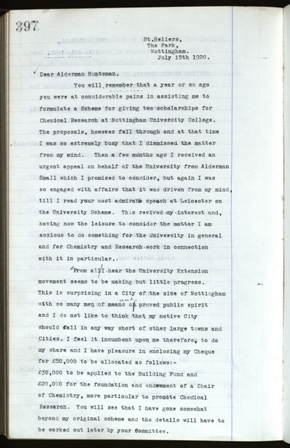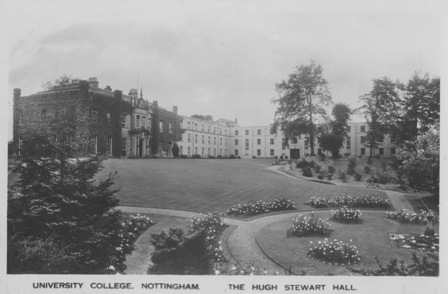Benefactors of University College
Sir Jesse Boot
Beginnings
Jesse Boot, 1st Lord Trent is the most high-profile and well remembered of the benefactors of University College. Over the course of ten years he gave donations totalling over £440, 000, over £9, 000, 000 in today’s terms. His gift of land at Highfields resulted in the establishment of the present University Park campus where he also funded the building work of the College. Today the original University College building is known as the Trent building.
Jesse Boot’s story is already well-known. Following his father’s early death in 1860 when Jesse was only 10, Jesse was forced to leave school to work in the family’s herbalist shop in Hockley. From these unpromising beginnings Boot built his business up to become the leading chemists in Britain. Starting in 1860 with just one shop, by 1914 there were 560 Boots stores across the country. His phenomenal success was recognised with a knighthood in 1909. In 1928 in recognition of his philanthropic gifts to the city he was created 1st Baron Trent of Nottingham.
Gifts to the University
The first recorded donation from Jesse Boot can be found in the Borough of Nottingham’s accounts for 1897. Among the small list of donations to the College prize fund is £1 1s from Jesse Boot, a humble beginning to his generosity to the College. When the College launched a fundraising appeal in 1920 prominent local people were contacted with requests for donations. Jesse Boot’s initial response to this request was not encouraging and certainly gave no indication of the massive generosity that was to come. In a letter dated 2 March 1920 Boot explains that he is unable to give a donation at present, adding that he may perhaps be able to do something small in the future. However despite his initial reluctance to contribute he was soon to change his mind in spectacular fashion. By the end of the same year Jesse Boot had given £50, 000 to the College, beginning his series of large gifts.

Letter from Jesse Boot in which he regrets that he is unable to donate to the University College endowment fund, 2nd March 1920. Ur 911/1

Letter from Jesse Boot offering a donation of £50, 000, 15th July 1920. UCN/G/4/2
By 1920, when Sir Jesse Boot donated £50, 000, the University College had outgrown its original home in Shakespeare Street and was urgently seeking a site and funds to construct new college buildings. Moreover it was hoped that the University College would soon be converted into a full University, and new buildings with room for expansion were needed to support this aim. Sir Jesse stipulated that £30, 000 of his donation was to go towards the building fund whilst the remaining £20, 000 was to be used to endow a chair in chemistry. Large as this donation was, it was only a small indicator of things to come. By 1921 Sir Jesse had added a further £120,000 to the building fund. The same year he donated his recently purchased estate at Highfields to be used as the site of the new university. In the following years Sir Jesse made a series of large donations, including shouldering the entire cost of building the Great Hall (part of the main University College building) and paying for the conversion of Lenton Hall into male student accomodation. His wife Florence also agreed to pay for the building of a hostel for female students, which was christened Florence Boot Hall. Ultimately Jesse Boot spent over £440,000 on the new college buildings, in addition to the cost of the land.
Letter from Jesse Boot praising the College buildings and promising to build a great hall and women's hostel,
UR 52/169
Personal involvement
As a benefactor of University College Sir Jesse Boot was not content to simply write a cheque and have no further involvement. The University College archive contains a fascinating series of letters between Sir Jesse Boot and officials at the College, including the registrar J. E. Shimeld, which demonstrate the depth of Sir Jesse’s personal involvement with the College. In particular one series of 460 letters (UR 794-799) show the importance to Sir Jesse of the college’s sports facilities. In 1925 Sir Jesse funded most of the cost of the new pavilion, playing fields, tennis courts and boating lake which were constructed next to the new college campus.
The sport’s facilities were an integral part of Sir Jesse’s vision for the new campus. He believed that providing students with open spaces and the opportunity to exercise would improve their health and enable them to get the most out of their studies. In this he was following the scheme that he had already implemented in his business, having established numerous sports’ clubs for Boots’ employees. In his letters to College officials he encouraged them to visit the Boots’ sport grounds and consult the sports committee. Sir Jesse provided the sport’s facilities at Highfields for the general public as well as the students of the College. The playing fields, courts, swimming pool and boating lake were all open to the public and part of the Highfields site was given as a park for the people of Nottingham.
Sir Jesse’s involvement in the running of the sport's facilities was felt in every area. The man whose passionate support for education led him to give thousands of pounds for a new college campus was equally interested in deciding where the tea urn should be placed in the refreshment pavilion. In his letters to Shimeld and others Sir Jesse discusses everything from the layout of the cricket pitch and the construction of the lake through to the admission price that should be set for the swimming baths and the type of cake that should be served in the pavilion. At his request weekly reports were sent to Sir Jesse by the managers and staff of the various sports facilities, such as the head groundsman. College officials were also careful to ensure that no member of staff was appointed to the sports facilities without Sir Jesse first being consulted.
View the catalogue of the University College collection (UCN).
Edmund Huntsman
Edmund Huntsman was a close friend of Jesse Boot and was instrumental in engaging his interest in University College. A strong supporter of the College, he was one of the leading figures in its campaign to acquire university status.
Edmund Huntsman was an important figure in the civic life of Nottingham in the early twentieth century. He was a member of the city council for many years and was elected as an alderman. In 1927 he became Mayor of Nottingham. A qualified solicitor, his association with University College began in 1907 when he was appointed director of the Law department. In 1917 he joined the governing body of the College, the College Council, serving as chairman from 1921-1939.
Alderman Huntsman was a key promoter of the scheme to acquire full university status for the University College. He gave innumerable public speeches on the topic and is credited with engaging Jesse Boot’s interest in the College.
The University College archive contains a file of papers relating to Edmund Huntsman, UCN/A/6/4/21, as well as a file concerning the endowment fund with which he was heavily involved, UR 52. As a member and later chairman of the College Council his name appears regularly in the minute books for that organisation. Further material relating to Alderman Huntsman can be found in a separate collection, MS 859. View the catalogue for MS 859.
WH Revis
William Henry Revis was an important benefactor of University College whose generosity in funding scholarships and loans enabled many students to attend University College who otherwise could not have afforded to do so.
William Henry Revis was born in Nottingham in 1849. He was educated at Nottingham High School before leaving to work in the lace industry. Together with two partners he owned a lace and hosiery machine building business on Wollaton Street Nottingham. Following a successful local career in the lace industry he emigrated to America in 1899 where he spent fifteen years working as a merchant, importing building materials. In 1914 he returned to England, settling in Weston-super-Mare where he lived until his death in 1923. In his will he left £10, 000 to University College Nottingham together with a portion of his estate. Taken together the total bequest was almost £48, 000. This was the most significant donation to University College after the gifts of Sir Jesse Boot. The trustees of Revis’ will directed that the money should be used to fund scholarships, grants and loans for poor students “of pregnant parts and laudable inclination by whom a full education cannot be reached without considerable money help”.
The University College archive contains numerous files relating to the WH Revis bequest. A bequest fund committee was established to manage the income from the bequest and to determine to whom the scholarships, grants and loans should be awarded. The papers of this committee are contained in the College archive (UCN/G/9/7). View the catalogue record for UCN/G/9/7.
Example of minutes from the Revis committee, 9 August 1927
The WH Revis bequest fund is still in operation at the University of Nottingham helping to fund part-time postgraduate students. The university’s donor recognition society, the Revis Circle, was named after WH Revis, commemorating his generosity to University College.
View the catalogue record for the University College collection (UCN).
HF Lancashire and George Spencer
Herbert Lancashire and George Spencer were strong supporters of the College who together gave money to endow one of its chairs.
Herbert Lancashire and George Spencer were prominent figures in the East Midlands hosiery industry. Both men had a long-standing interest in the University College with Lancashire serving on the College Council from 1917-1926, when he became one of the Vice-Presidents of the College, and Spencer joining the Council in 1924 and becoming Vice-President in 1930. The two men were particularly interested in the work of the College’s textile department which Lancashire helped to reorganise after the First World War. In January 1928 Lancashire and Spencer gave £10, 000 each to endow a chair at the College. The money was used to endow the Lancashire-Spencer Chair of Physics.
Letter from HF Lancashire offering a donation from himself and George Spencer to the University College
Correspondence concerning the Lancashire-Spencer gift can be seen in files UR 57 and UR 59 of the University College collection.
Hugh Stewart
Hugh Stewart was principal of University College from 1929 until his sudden death in 1934. Following his death a Hugh Stewart Memorial Fund was launched with proceeds going to the College.
Hugh Stewart was born in September 1884 in East Aberdeenshire, Scotland. After being educated at Fettes College in Edinburgh he won a scholarship to Edinburgh University where he stayed for a year before moving to Trinity College, Cambridge. After leaving university Hugh Stewart went on to enjoy a varied and successful career which saw him employed as a private tutor in Russia, a Professor of Classics in New Zealand and a Colonel in the army during the First World War. At the end of the war he moved to Leeds University before accepting the position of Principal of University College, Nottingham. After a holiday to New Zealand he died onboard ship on the journey home. In his will he left £1, 000 to University College. Three years later his widow, Margaret Massey-Stewart, gave £5, 000 to establish the Hugh Stewart Scholarship to be awarded to a male arts graduate. Lenton Hall, a student residence, was renamed Hugh Stewart Hall in his memory.

A collection of papers relating to Hugh Stewart (MS 854) has been transferred to Manuscripts and Special Collections by family members who still retain strong links with the University. View the catalogue record for MS 854.
Next page:
University College collection